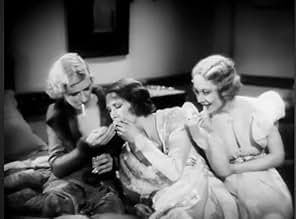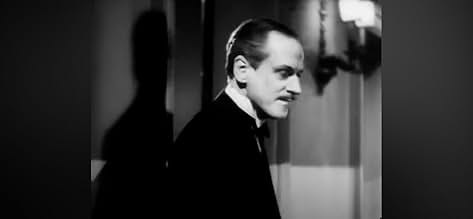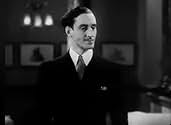Agrega una trama en tu idiomaWhile he's a houseguest at an upper-class gathering, wealthy Jewish man Ferdinand de Levis is robbed of £1,000 with evidence pointing towards the guilt of another guest, Captain Dancy.While he's a houseguest at an upper-class gathering, wealthy Jewish man Ferdinand de Levis is robbed of £1,000 with evidence pointing towards the guilt of another guest, Captain Dancy.While he's a houseguest at an upper-class gathering, wealthy Jewish man Ferdinand de Levis is robbed of £1,000 with evidence pointing towards the guilt of another guest, Captain Dancy.
- Dirección
- Guionistas
- Elenco
Cecily Byrne
- Lady Adela
- (as Cicely Byrne)
Marcus Barron
- The Lord Chief Justice
- (as Marcus Baron)
- Dirección
- Guionistas
- Todo el elenco y el equipo
- Producción, taquilla y más en IMDbPro
Opiniones destacadas
You'd probably think that you don't want to see this. It's not much fun but you'll be glad you've seen it once. It's a well made picture with a laudable message and once you get past those weird accents, you'll actually find it really quite gripping.
What a horrible bunch of people! What an awful artificial stiff upper lip world they have created for themselves. Everyone is vile - even Basil Rathbone and he's the hero. It's rare that you find a film without any likeable people in it whatsoever and that makes this quite difficult to engage with. It wouldn't have course have been made if society toffs like those depicted in this film didn't actually exist. It does therefore give us a fascinating glimpse into a society which fortunately no longer exists.
It's a rather dry and worthy film but is nevertheless addictively watchable. Directed by the famously humourless tyrant of England's early thirties film industry Basil Dean, he injects absolutely no light relief in it at all. One gets the sense that Mr Dean saw this a far too serious a subject for anyone to even think about smiling in it. It is nevertheless an excellent story and Mr Dean does tell it effectively and by using a technique of restrained sustained release of outrage, he evokes in us an escalating sense of anger.
Racism is certainly not just a thing of the past but it's shocking to see it expressed so blatantly as though it's normal - especially by the upper classes. These days we don't expect to encounter such explicit bigotry from 'the ruling classes' so hearing such attitudes coming from those stiff polished accents is somewhat unnerving. That this was normal is really quite shocking. It's an intelligent and clever little film - one you'll remember.
What a horrible bunch of people! What an awful artificial stiff upper lip world they have created for themselves. Everyone is vile - even Basil Rathbone and he's the hero. It's rare that you find a film without any likeable people in it whatsoever and that makes this quite difficult to engage with. It wouldn't have course have been made if society toffs like those depicted in this film didn't actually exist. It does therefore give us a fascinating glimpse into a society which fortunately no longer exists.
It's a rather dry and worthy film but is nevertheless addictively watchable. Directed by the famously humourless tyrant of England's early thirties film industry Basil Dean, he injects absolutely no light relief in it at all. One gets the sense that Mr Dean saw this a far too serious a subject for anyone to even think about smiling in it. It is nevertheless an excellent story and Mr Dean does tell it effectively and by using a technique of restrained sustained release of outrage, he evokes in us an escalating sense of anger.
Racism is certainly not just a thing of the past but it's shocking to see it expressed so blatantly as though it's normal - especially by the upper classes. These days we don't expect to encounter such explicit bigotry from 'the ruling classes' so hearing such attitudes coming from those stiff polished accents is somewhat unnerving. That this was normal is really quite shocking. It's an intelligent and clever little film - one you'll remember.
It's really the subject matter of this film that makes it enthralling to watch. Basil Rathbone is effective as the wealthy, and Jewish, "De Levis" who arrives for a weekend with his supposed friends. He goes for a bath and when he returns discovers that £1,000 of his money has been stolen. He alerts his hosts and after initially suggesting it be forgotten, agree to summon the authorities and it's at this point he alights on his prime suspect. "Capt. Clancy" (a solid contribution from Miles Mander). This officer had the room next door, and as the conversation expands, we discover that he is quite an athletic man who could easily have jumped from his balcony to his neighbour's and appropriated the cash. Of course, actual proof is seriously lacking and when he makes his accusation, "De Levis" soon finds out that his friendships are little better than skin deep. The great and the good rally around "Clancy" and suspend this impudent upstart from their exclusive number. Having been subject to the allegation, however, the defendant has little choice but to sue to protect his honour and it's in court that the truth will hopefully out. The first twenty minutes, or so, are quite interesting. They clearly illustrate a degree of resentment not just of the man's wealth, but of his Jewishness. Whilst never directly expressed, anti-Semitism is writ large here. Sadly, though, once the court case starts and thereafter, the story starts to meander and become a bit contrived and muddled. It's at this stage that you notice the lack of quality in the production and an excess of script that adds very little to the thrust of this rather bold and accusatory story. It's certainly worth a watch. That this was a topic deemed worthy of commercial release as early as 1933, before the rise of National Socialism in Germany, speaks volumes for the anticipation of the hatred that existed then, and was only about to increase, of the Jewish race. Rathbone delivers well as the clever and sophisticated gent - but it all just falls a little but short at the end.
This film was shown yesterday at the NFT as part of the UK Jewish film festival.It is based on a 1922 play by Galsworthy.Two of the original cast members are in the film,one of them being the solicitor.There are a lot of familiar faces in the film.Including Felix Aylmer,playing of course a Judge and Alan Napier and Miles Mander who were both to go on to successful careers in Hollywood.The basic theme is anti semitism of the upper class.It is thus a very unusual film for its time.Given that this was a topic that was not addressed in Hollywood till 1947 in "Gentlemans Agreement".In fact the only other film that i can think of in this period is "Jew Suss" which was produced at Gaumont British in 1934.Of course the censor made life difficult by preventing any films critical of Germany eg "Pastor Hall" being produced till war was declared. This is a very powerful and moving film with a fine performance by Basil Rathbone.It is a shame that there was no Jewish actor at the time of sufficient stature to take the part.If made in America it would have been ideal for Paul Muni. The ending is a bit melodramatic but the last shot in the film is both haunting and poignant given the events of the Holocaust.this film is well worth viewing.It can be currently seen at the BFI South Bank mediatheque.
This powerful drama is based upon a play by John Galsworthy which was staged at St. Martins Theatre in 1922 and ran for a year. It was filmed a second time in 1976 by the BBC for their Play of the Month series, and starred Edward Fox. In this film, the lead role is played by Basil Rathbone. He portrays an extremely wealthy and self-confident English Jew, who will not back down when he comes under anti-Semitic attack by his socially prominent non-Jewish friends. Considering bow many fascists there were in England in the 1930s, the fact that this film was released in the year Hitler came to power is highly significant. It was a stinging rebuke to those who were thrilled at the rise of the Nazis in Germany. But the story itself has nothing to do with politics and everything to do with social hypocrisy and prejudice. The film opens with Rathbone staying as a guest in a country mansion near Newmarket as part of a house party who have been to the races. One of the high-profile social guests is secretly desperate for money and he notices that Rathbone has rather a lot of cash on him because at the races he has just sold one of his race horses to someone on the spur of the moment, and has a fad wad of bills in his wallet as a result. That evening the man sneaks into Rathbone's room and steals his money. Rathbone complains to his host that he has been robbed and the social niceties quickly begin to unravel. It seems that it is all very well for a social guest complain of such a thing if he is an Englishman, but when Rathbone makes such a complaint he is accused of being 'a dirty Jew'. He then says he will not stand for this 'insult to my race'. Rathbone figures out who the thief must be, but when he tries to obtain justice, he is forced to resign from his London gentlemen's club and go into social purdah and disgrace because as a mere Jew he has dared to call into question the honour of a 'real' (i.e. a non-Jewish) gentleman. When I was young and knew various elderly aristocrats of the old school who had been young or middle-aged adults in 1933, I often came across the most outrageous anti-Semitic outbursts, especially from some haughty dowagers who managed to pronounce the word 'Jew' with twisted lips and a sneer, holding their noses high in disdain. Outright anti-Semitism was most definitely common and also socially acceptable in England in 1933, there is no question about it. In fact, it only began to become unfashionable in the aftermath of the Second World War, when the truth about the Holocaust became known and anti-Semites were shamed into keeping silent lest they be thought to be approving of mass-murder (as a handful of 'Holocaust deniers' still do.) In this film, Rathbone is rich enough and proud enough to refuse to give ground, and he goes to court willingly as a defendant in a libel action. I shall not reveal how it all turns out, except to say that things become increasingly fraught and the story becomes more and more dramatic. I saw this film on a DVD obtained from a private collector, and it had been made from a very poor print marred by a continuous time-code all the way through, with the initial scenes barely visible, and the sound track semi-inaudible. I do hope that a decent copy exists somewhere, but I sat through the barrage of technological inadequacies and was glad to see such an impressive film despite all those obstacles. There does not seem to be any commercial copy of this film available anywhere. It needs to be rescued, as it is a milestone in social drama and very good indeed. The two directors were Basil Dean and Thorold Dickinson. Dean is probably best known for having directed the 1934 LORNA DOONE with Margaret Lockwood. Dickinson directed John Gielgud in THE PRIME MINISTER (1941), about Disraeli, and the notoriously successful film GASLIGHT (1940). Assistant Director on the film was the young Carol Reed, in his very first film job. He worked again with Basil Dean the following year on AUTUMN CROCUS (1934). There is no information available to explain what went wrong and why there were two directors on the film. But it all works very well, whoever really finished it and supervised the editing.
Wealthy Jew Basil Rathbone sells one of his racehorses for a thousand pound in banknotes, then goes to a house party. The money vanishes from his room. The police come and conclude it was a burglary. Rathbone is convinced the thief was Captain Miles Mander. The host and guests can't believe this, and one of them warns Rathbone will not be approved for membership in a racing club if he persists. Seeing this as a bargain, he says nothing. However, gossip gets about the other club he and Mander are members of, and a committee quickly concludes there is no evidence. Mander threatens the courts, and Rathbone is suspended until the case is heard. Instead, he resigns and prepares to defend himself.
It's based on one of John Galsworthy's thin-lipped plays, and the choice of the two leads is one calculated to swing sympathy towards the Jew, and making clear the anti-Semitism that suffused the upper classes. Rathbone is not a comic Golders Green rag merchant, but well educated, handsome, well dressed, and speaking the King's English, while Manders was already an expert in playing rotters in the movies. Although directors Basil Dean and Thorold Dickinson open it up a bit, mostly through edits, it remains a photographed stage play.
It's based on one of John Galsworthy's thin-lipped plays, and the choice of the two leads is one calculated to swing sympathy towards the Jew, and making clear the anti-Semitism that suffused the upper classes. Rathbone is not a comic Golders Green rag merchant, but well educated, handsome, well dressed, and speaking the King's English, while Manders was already an expert in playing rotters in the movies. Although directors Basil Dean and Thorold Dickinson open it up a bit, mostly through edits, it remains a photographed stage play.
¿Sabías que…?
- Citas
Ferdinand de Levis: [to Dancy] You called me A damned Jew. My race was old when you were all savages. I am proud to be a Jew. Au Revoir - in the courts!
- ConexionesReferenced in Horizontes perdidos (1937)
Selecciones populares
Inicia sesión para calificar y agrega a la lista de videos para obtener recomendaciones personalizadas
Detalles
- Tiempo de ejecución1 hora 7 minutos
- Color
- Relación de aspecto
- 1.37 : 1
Contribuir a esta página
Sugiere una edición o agrega el contenido que falta

Principales brechas de datos
By what name was Loyalties (1933) officially released in Canada in English?
Responda
























